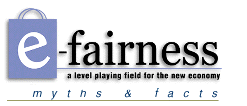 |
|
 |
Internet Tax Policy Myths and Facts Myth: Supporters of a level playing field advocate creating new taxes on the Internet. FACT: The e-Fairness Coalition opposes creating any new or discriminatory taxes on the Internet. The Coalition supports collecting the existing tax in a fair and equitable manner for all transactions. Whether consumers shop at a store on "Main Street" or on the Internet, their commercial transactions should be subject to the same policies. A level playing field provides equal treatment for all businesses and consumers.
Myth: State and local governments are attempting to tax the Internet. FACT: Requiring online merchants to collect sales tax does not create a new tax. Currently, if the online retailer does not collect the tax, consumers are required to pay a corresponding use tax to their home taxing jurisdiction. Compliance with the use tax requirements is very low. Therefore, most Internet shoppers are in violation of the law simply because they choose not to or do not understand the importance of paying the use tax. The e-Fairness Coalition advocates taking the burden of paying the use tax off of the consumer and providing all retailers with equal sales tax collection responsibilities.
Myth: Congress has already banned Internet taxes. FACT: The Internet Tax Freedom Act of 1998 prohibits the creation of any new and discriminatory taxes on the Internet, such as Internet access fees. Congress did not prevent states from charging and collecting sales and use taxes.
Myth: State funded programs like education, law enforcement and transportation will not be affected if online transactions remain untaxed. FACT: According to the U.S. Census Bureau, 33 percent of state revenues come from sales taxes. If online and mail order retailers are not required to collect sales taxes, state and local governments stand to lose more than $20 billion in revenues by 2003. More than 40% of sales tax revenue fund essential government services including education, law enforcement and transportation. The Coalition favors fair and equal tax policy that will allow communities to continue to see the many benefits these revenues provide. If sales and use taxes arent collected on e-commerce transactions, state and local governments will have to find other ways to offset their losses. This could mean raising taxes or cutting back on essential community services.
Myth: E-commerce needs preferential tax treatment because it is a new industry. FACT: The Internet has reached 50 million people in four years, compared to its technological counterparts: radio and TV, which took 38 and 13 years respectively, to reach the same number of users. Growing at a meteoric rate, the Internets development has been nothing short of phenomenal. In 1998, Forrester Research projected online retail sales to more than double in the next two years. Requiring online retailers to collect sales taxes will not harm the growth of the Internet economy. Current tax policy gives online retailers a competitive advantage over brick-and-mortar retailers. The Coalition supports tax policies that do not allow discriminatory practices to thrive. This will level the playing field for the new economy that includes a strong Internet presence in our economy.
Myth: Taxing E-commerce will slow the growth of the Internet. FACT: A level playing field is best for the new economy. Fair and healthy competition in the marketplace offers added value to consumers. With online and brick-and-mortar retailers competing on a level playing field, consumers will benefit from competitive pricing, better offers and customer service. With a level playing field, all retailers can operate in an equal climate and consumers will enjoy the freedom of shopping choices without market distorting tax preferences.
Myth: H.R. 4462, the "Fair and Equitable Interstate Tax Compact Simplification Act of 2000," and the "Internet Simplification and Equity Act," which Senator Dorgan (D-ND) will introduce are unconstitutional because they contradict the Supreme Courts Quill decision and because they encroach upon states rights. FACT: These bills are clearly constitutional. The Supreme Court itself stated in Quill that Congress has power to overrule that decision: "No matter how we evaluate the burdens that use taxes impose on interstate commerce, Congress remains free to disagree with our conclusions." Also, the bills do not violate the tenth amendment because they do not require the states to do anything; the legislation merely puts valid conditions on a grant of authority.
The e-Fairness Coalition (http://www.e-fairness.org/) represents a total of over 1.5 million retail stores and real estate businesses as well as 1 out of every 5 American workers nationwide. The Coalition advocates fairness for businesses and consumers. It supports a level playing field that ensures consumers are treated fairly regardless of where they choose to shop - in traditional or online stores. Its members include brick-and-mortar and online retailers, retail corporations and associations, publicly- and privately-owned shopping centers, outlet centers and independently owned shops.
|